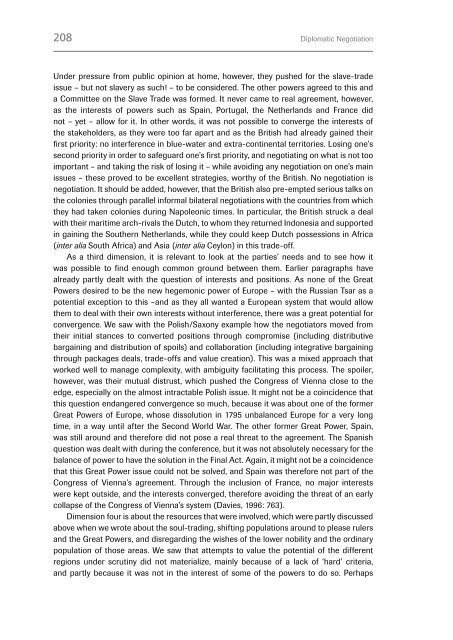Diplomatic Negotiation
Diplomatic_Negotiation_Web_2015
Diplomatic_Negotiation_Web_2015
You also want an ePaper? Increase the reach of your titles
YUMPU automatically turns print PDFs into web optimized ePapers that Google loves.
208 <strong>Diplomatic</strong> <strong>Negotiation</strong><br />
Under pressure from public opinion at home, however, they pushed for the slave-trade<br />
issue – but not slavery as such! – to be considered. The other powers agreed to this and<br />
a Committee on the Slave Trade was formed. It never came to real agreement, however,<br />
as the interests of powers such as Spain, Portugal, the Netherlands and France did<br />
not – yet – allow for it. In other words, it was not possible to converge the interests of<br />
the stakeholders, as they were too far apart and as the British had already gained their<br />
first priority: no interference in blue-water and extra-continental territories. Losing one’s<br />
second priority in order to safeguard one’s first priority, and negotiating on what is not too<br />
important – and taking the risk of losing it – while avoiding any negotiation on one’s main<br />
issues – these proved to be excellent strategies, worthy of the British. No negotiation is<br />
negotiation. It should be added, however, that the British also pre-empted serious talks on<br />
the colonies through parallel informal bilateral negotiations with the countries from which<br />
they had taken colonies during Napoleonic times. In particular, the British struck a deal<br />
with their maritime arch-rivals the Dutch, to whom they returned Indonesia and supported<br />
in gaining the Southern Netherlands, while they could keep Dutch possessions in Africa<br />
(inter alia South Africa) and Asia (inter alia Ceylon) in this trade-off.<br />
As a third dimension, it is relevant to look at the parties’ needs and to see how it<br />
was possible to find enough common ground between them. Earlier paragraphs have<br />
already partly dealt with the question of interests and positions. As none of the Great<br />
Powers desired to be the new hegemonic power of Europe – with the Russian Tsar as a<br />
potential exception to this –and as they all wanted a European system that would allow<br />
them to deal with their own interests without interference, there was a great potential for<br />
convergence. We saw with the Polish/Saxony example how the negotiators moved from<br />
their initial stances to converted positions through compromise (including distributive<br />
bargaining and distribution of spoils) and collaboration (including integrative bargaining<br />
through packages deals, trade-offs and value creation). This was a mixed approach that<br />
worked well to manage complexity, with ambiguity facilitating this process. The spoiler,<br />
however, was their mutual distrust, which pushed the Congress of Vienna close to the<br />
edge, especially on the almost intractable Polish issue. It might not be a coincidence that<br />
this question endangered convergence so much, because it was about one of the former<br />
Great Powers of Europe, whose dissolution in 1795 unbalanced Europe for a very long<br />
time, in a way until after the Second World War. The other former Great Power, Spain,<br />
was still around and therefore did not pose a real threat to the agreement. The Spanish<br />
question was dealt with during the conference, but it was not absolutely necessary for the<br />
balance of power to have the solution in the Final Act. Again, it might not be a coincidence<br />
that this Great Power issue could not be solved, and Spain was therefore not part of the<br />
Congress of Vienna’s agreement. Through the inclusion of France, no major interests<br />
were kept outside, and the interests converged, therefore avoiding the threat of an early<br />
collapse of the Congress of Vienna’s system (Davies, 1996: 763).<br />
Dimension four is about the resources that were involved, which were partly discussed<br />
above when we wrote about the soul-trading, shifting populations around to please rulers<br />
and the Great Powers, and disregarding the wishes of the lower nobility and the ordinary<br />
population of those areas. We saw that attempts to value the potential of the different<br />
regions under scrutiny did not materialize, mainly because of a lack of ‘hard’ criteria,<br />
and partly because it was not in the interest of some of the powers to do so. Perhaps


